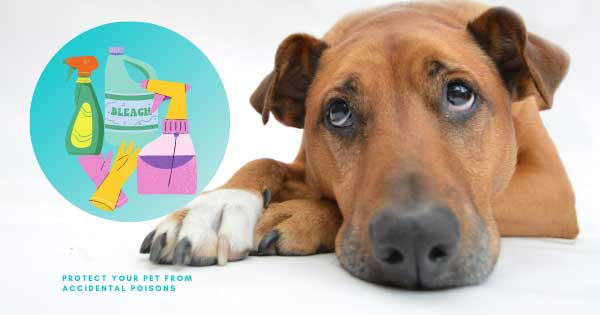
How to protect your pet from accidental poisons in your home. As a pet parent, you want to make sure that your furry family member has a safe, healthy, and happy life. However, as they have a curious nature and love to explore, they can easily get into trouble and accidentally ingest something poisonous. Many household items can be highly toxic to pets, even if they aren’t dangerous to us. They may seem harmless or unlikely to appeal to your four-legged companion, but thousands of pet poisoning cases are reported every year. In observance of National Pet Poison Prevention Awareness Month (March) and National Poison Prevention Week, our team at Naples Coastal Animal Hospital urges all pet owners to identify hazardous items in and around their homes in order to avoid potentially life-threatening situations.
How to Prevent and Protect Your Pet from Accidental Poisons
Manage Your Medications
Human medication, both over-the-counter and prescription, tops the list of substances that most often cause pet poisoning. Human medication can be extremely dangerous to pets because they have a different type of metabolism. Poisoning usually occurs when a pill is accidentally dropped or pill bottles are left in easy to reach places. Accidental poisoning can also occur if you give your pet medication without a proper prescription.
Even one small pill can cause serious harm, including kidney and liver failure. To prevent these cases, make sure all medications are safely stored inside a medicine cabinet or somewhere up high where it is impossible for your four-legged friend to get to them. You should also ensure you store human medication and pet medication separately.
Don’t Forget Prescription Veterinary Products
Veterinary medications are often flavored to increase palatability, however, this means that your pet may think of them as treats. This means that they’ll be willing to chew more than necessary, which poses a real overdose danger. Your best precaution is to keep all medications out of your pet’s reach. Also, ensure you pet-proof as animals can chew through plastic bottles.
Remove Poisonous Plants From Your Home
While plants in our homes and backyards do a great job at livening up an area and purifying the air in your surroundings, some species can harm your pets. Certain plants, both indoor and outdoor varieties, are toxic to pets and could prove to be fatal if ingested. Some of the most common toxic plants include azalea, oleander, spring bulbs, sago palm, jade, daffodils, autumn crocus, lilies, philodendron, tulips, bird of paradise, and fig tree. The next time you’re itching to bring new greenery into your home, take time to look it up and choose pet-friendly plants.
Know Which Foods are Safe
Often foods that are healthy for people can be deadly to pets. This includes grapes, raisins, onions, garlic, avocados and macadamia nuts are just some examples of human foods that should never be fed to pets. This is alongside the standard, chocolate, candy, and raw yeast dough that we are often warned about. While many aren’t lethal, they can cause vomiting, weakness, elevated body temperature, diarrhea, and excessive urination. Some, like grapes and raisins, can also cause kidney or liver failure. Large amounts of chocolate and alcohol can cause comas, central nervous system depression, and death within 24 hours. When it comes to human food, the safest approach is to always lock it away safely. You should also use secure trash cans, and keep pets out of the kitchen, especially during meal times.
Lock Away Toxic Chemicals
There’s no way to predict where your pet’s curiosity will lead them. Several items used for gardening and household cleaning can be dangerous to cats and dogs. As such, items such as fertilizers, antifreeze, pesticides, rodenticides, air fresheners, household cleaners, laundry supplies, solvents, and other chemical-based products should be stored in a safe place out of your pet’s reach and clean up any spills of hazardous materials. You should also never put rat bait where your pet can easily find it, and prevent them from catching the poisoned rats. Always protect your pets from exposure when using these chemicals by keeping them inside or in a gated area away from usage.
What to do in Case of Pet Poisoning
Learning the signs and symptoms of pet poisoning can prepare you in case an emergency happens. The symptoms of poisoning can vary depending on the type of toxin consumed and the amount ingested. Some of the most common signs of pet poisoning include:
- Diarrhea and upset stomach
- Vomiting
- Excessive and foamy drooling
- Seizures
- Difficulty breathing
- Sudden weakness and lethargy
- Black or bloody stool
- Excessive thirst and urination
- Abnormal behavior
If your pet shows any of these signs or you suspect that they’ve ingested something poisonous, first separate your pet from the product so they can’t ingest more. Then, immediately contact your vet, nearest emergency pet hospital, or call the Animal Poison Control Center at 888-426-4435. Make note of the toxin you think was ingested and if possible pack up a sample to take to your vet. Share the symptoms your pet is showing and what time they might have ingested the toxin.
Your vet may recommend inducing vomiting depending on what was ingested and the timing of when it was infested or administering activated charcoal to help absorb the poison in your pet’s stomach. Lab tests may be done to assess organ damage. Denosyl may also be recommended if your vet suspects liver damage. However, don’t try any remedy without the advice of a pet health care professional.
Protect Your Pet from Accidental Poisons
If you believe your pet has ingested a poisonous substance, do not hesitate to contact Naples Coastal Animal Hospital at (239) 500-0105 to speak with an emergency vet. The faster you act, the better the chances of your pet making a full recovery.
